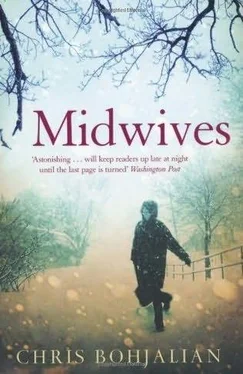Chris Bohjalian - Midwives
Здесь есть возможность читать онлайн «Chris Bohjalian - Midwives» весь текст электронной книги совершенно бесплатно (целиком полную версию без сокращений). В некоторых случаях можно слушать аудио, скачать через торрент в формате fb2 и присутствует краткое содержание. Жанр: Современная проза, на английском языке. Описание произведения, (предисловие) а так же отзывы посетителей доступны на портале библиотеки ЛибКат.
- Название:Midwives
- Автор:
- Жанр:
- Год:неизвестен
- ISBN:нет данных
- Рейтинг книги:5 / 5. Голосов: 1
-
Избранное:Добавить в избранное
- Отзывы:
-
Ваша оценка:
- 100
- 1
- 2
- 3
- 4
- 5
Midwives: краткое содержание, описание и аннотация
Предлагаем к чтению аннотацию, описание, краткое содержание или предисловие (зависит от того, что написал сам автор книги «Midwives»). Если вы не нашли необходимую информацию о книге — напишите в комментариях, мы постараемся отыскать её.
Midwives — читать онлайн бесплатно полную книгу (весь текст) целиком
Ниже представлен текст книги, разбитый по страницам. Система сохранения места последней прочитанной страницы, позволяет с удобством читать онлайн бесплатно книгу «Midwives», без необходимости каждый раз заново искать на чём Вы остановились. Поставьте закладку, и сможете в любой момент перейти на страницу, на которой закончили чтение.
Интервал:
Закладка:
Consequently, I spent a good part of the night after the opening arguments, the first Wednesday of the trial, in the McKennas' barn with Rollie and Tom and Garrett Atwood. The four of us were so stoned by ten o'clock that we were actually cupping our hands around the snout of poor Witch Grass and trying to blow the dope we'd just held in our own lungs into hers.
The horse got a little giddy, but not like us. The day's rain had left the inside of the barn damp, but Tom and Garrett had the testosterone-driven insight to bring blankets with them as well as marijuana, and Tom and I curled up to neck in one corner of the barn, while Rollie and Garrett found a nook of their own. Most of the clouds had moved on to the east, and a magnificent harvest moon lit the sky through the few that remained.
By the time I staggered home shortly before midnight, the only lights on in our house were upstairs in my parents' bedroom. I assumed they were waiting up for me, and would descend upon me the moment I opened the front door. And so with the inspired logic of a stoned teenager, I wandered around to the back of our home and pulled open the storm window on the side of my mother's office. I'd always suspected by the way my father surrounded the metal edges with caulking and Mortite each fall that the storm window didn't close properly, and I was right. It was easy to open it from the outside, and easy to pull myself over the ledge and crawl into the room.
Beside the window was my mother's desk, and in the moonlight I could see that one of her notebooks was open upon it. Earlier that evening she had apparently been writing.
I pushed shut the door, pressing it silently into its frame so no light would escape when I switched on the desk lamp. Had I not been stoned, I like to believe I would have respected my mother's privacy and left her diary alone, but I can't say for sure that's the case. And regardless of whether drugs can or should excuse bad behavior, there's no question they can often explain it. Hunched over the desk, I started to read, and when I saw what my mother had written about March 15, I flipped back the pages a full half a year.
In my parents' minds, I hadn't come home until two in the morning, because that was the time I finally stopped reading and decided to come upstairs. And though their room seemed silent when I started up the steps, their door opened the moment I reached the landing, and I realized they were both awake.
Had my mother not been on trial that moment, I probably would have been grounded through Thanksgiving. But she was on trial, and as angry as my parents were at me for worrying them and behaving irresponsibly, it was clear that they attributed my behavior to the strain of the trial and the long days spent in court. They blamed themselves more than me and took some comfort in the knowledge that I'd been no farther from home the whole time than Rollie's barn, and I'd been there with a group of other kids.
We were all cranky at breakfast the next morning from too little sleep, and only I had an appetite, but otherwise Thursday began the way the rest of the week had: My parents discussed what Stephen had said was likely to occur that day in the courthouse, and I listened and learned and worried.
The first witness Bill Tanner put on the stand wasn't a state trooper or doctor; it wasn't the medical examiner or a midwife.
It was a weatherman. The first person I saw testify under oath was the voice of Vermont Public Radio's twice-daily "Eye on the Sky," the principal source of weather information back then for most of us in the Northeast Kingdom. The fellow was shorter than I had imagined, but he was also much cuter. Listening to his voice in the car or some days over breakfast, I'd always envisioned a tall geeky man with glasses, when in reality he was a strong, stocky fellow with wavy blond hair and apparently perfect eyesight.
He couldn't have testified for more than twenty minutes; he was probably gone from the courtroom by nine-thirty. I was fascinated by the way one bailiff led him into the room and another swore him in. Tanner then made sure everyone on the jury understood that this man was probably Vermont's foremost expert on weather-a meteorologist who not only forecast the weather but also taught meteorology at a college in the northern corner of the state-and he'd spent all of March 12 and 13 warning his listeners about the rains and the cold that were approaching, and the tremendous likelihood that highways would freeze.
"Did you ever suggest that people should stay off the roads?" Tanner asked him.
"I did," he answered. "Wednesday afternoon and all Thursday I said the storm would be nasty and there would be lots of black ice. I said the conditions would be extremely hazardous."
Then for good measure Tanner played the weatherman's two-minute forecast from Thursday the thirteenth's lunchtime edition of the "Eye on the Sky," and we heard a taped version of the fellow saying exactly that.
"Her body was under a sheet, and it was pulled up to her neck," said Leland Rhodes, the state trooper who to this day comes to mind whenever I see a trooper's green car fly past me on the interstate. He sat on the stand with his shoulders straight and his wide-brimmed trooper's hat in his lap. His uniform was so crisp and well ironed that the fabric looked as unbending as the clothes painted on plastic dolls. Whatever distrust people have these days for police officers was untapped in our small corner of the Kingdom in 1981, and Rhodes was a powerfully honest figure.
Besides, as Tanner had gone to great pains to make clear to the jury, Rhodes had no reason to exaggerate or to lie.
"You knew she was dead?" Tanner asked.
"We knew from the radio call that she was dead before we arrived."
"The dispatcher had informed you?"
"That's right."
"Describe the condition of the bedroom," Tanner said, and beside me my grandmother flinched.
Before Rhodes could begin, however, Stephen stood to object: "Your Honor, this line of questioning is completely gratuitous."
Judge Dorset shook his head and said he would allow it. With the help of an occasional question from the state's attorney, Rhodes then told the jury what he had seen when he arrived at the Bedfords'. His voice remained forceful but calm, even when he was recalling particularly grisly details, and he spoke for close to an hour before he finished and Stephen was allowed a cross-examination.
Rhodes began with his discovery of the way my mother's station wagon was lodged in a snowbank, and how he and his partner had to walk slowly across the yard to the front door: They had thought the grass would offer better footing than the bluestone glazed over with ice.
No one answered the door when they knocked, but they had expected that, and they let themselves in and shouted up the stairs from the front hall. My mother called from the bedroom to join them on the second floor.
Although Rhodes noted that his watch said seven thirty-four, the drapes were still drawn in the bedroom, and only the floor lamp in the corner was on. The room, in his opinion, was depressing and dim and quiet except for Asa Bedford's hiccuplike sobs.
He said Anne Austin was seated in a chair against one wall, rocking the baby in her arms. He thought the baby was asleep. Asa was sitting on the bed by his wife, his body partway hunched over hers, and my mother was sitting behind him, rubbing his shoulders as he cried.
Rhodes usually spoke directly to the jury or to Tanner. After watching other witnesses over the next week and a half, it became apparent even to me that Rhodes-like many police officers-testified often and was comfortable in the witness stand.
"Tell us about the items you found in the room," Tanner suggested, and Rhodes obliged. He began with the basics of any home birth, the sorts of things that might just as easily have peppered the aftermath of an experience my mother would have viewed as exquisitely beautiful: A box of fresh sanitary pads, and a waste-basket filled with used ones. A rectal thermometer. A bulb syringe, still partially filled with mucus. An opened tube of a jelly lubricant. A glass of water with a straw in it. Metal clamps. A Dixie cup of orange juice. Scissors. A pie plate in which the placenta would have been received. A needle. A vial of Pitocin. Paper towels. Three brown paper grocery bags in which the Bedfords had sterilized the sheets and blankets and towels they had carried into the bedroom, and then all of those linens themselves, some folded and fresh, some dark red with dried blood.
Читать дальшеИнтервал:
Закладка:
Похожие книги на «Midwives»
Представляем Вашему вниманию похожие книги на «Midwives» списком для выбора. Мы отобрали схожую по названию и смыслу литературу в надежде предоставить читателям больше вариантов отыскать новые, интересные, ещё непрочитанные произведения.
Обсуждение, отзывы о книге «Midwives» и просто собственные мнения читателей. Оставьте ваши комментарии, напишите, что Вы думаете о произведении, его смысле или главных героях. Укажите что конкретно понравилось, а что нет, и почему Вы так считаете.











